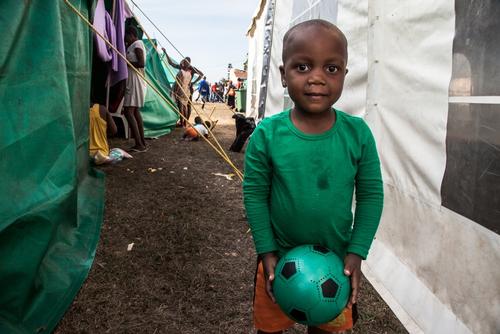DURBAN – One month into its medical humanitarian intervention following a series of violent xenophobic attacks in South Africa’s KwaZulu Natal (KZN) province, a team from Médecins Sans Frontières (MSF) is reorienting their work to meet the psychological needs of traumatized foreign nationals sheltering in the single remaining displacement camp, as well as offering medical support in Malawi and Zimbabwe.
The Chatsworth camp, south of the coastal city of Durban, is currently home to 520 foreign nationals – mostly refugees and asylum seekers from Burundi and the Democratic Republic of Congo. They were left behind after more than 3,000 Malawians, as well as several hundred Mozambicans and Zimbabweans were repatriated to their home countries.
Initially about 7,000 people sought refuge in three different displacement camps in Durban. The Burundians and Congolese are now stuck in limbo: they cannot be repatriated to conflict zones they fled from but they don’t feel safe to re-integrate into communities that they fled from only weeks before.
Here, MSF psychologists found significant levels post-traumatic stress among the majority of camp residents assessed using an internationally recognized screening tool. The Harvard Trauma Questionnaire rates the frequency with which they experience nightmares, flashbacks, a sense of hopelessness and helplessness.
“The kind of trauma I saw in the Chatsworth camp is similar to what I’ve seen in displacement camps in Central African Republic and South Sudan where people have been exposed to active conflicts,” says MSF psychologist Gail Womersley. “From our interviews with these camp residents it’s clear that some have suffered cumulative traumas. They have experienced violence in their country of origin; again during the 2008 xenophobic violence, and yet again in 2015. However they also tell us about the daily level of discrimination and alienation they experience – at hospitals, in minibus taxis and from police elsewhere.”
Since early May the MSF team has provided psychological counselling sessions among groups and for individuals, including children. The team of 11, including medical doctors and nurses, have now reoriented their work toward this unmet need among the people in the camp. Prior to this, the team’s objective was to provide services in support where there were gaps in the response: for daily medical care, water and sanitation services, help for survivors of sexual and gender-based violence, and improved camp management.
Working in close collaboration with the KwaZulu-Natal (KZN) department of health, MSF has provided more than 1,400 consultations to displaced people since April 14 through a regular mobile clinic at the camp. The team is now handing over full responsibility for healthcare provision to the health department in order to focus on the psychological needs of people.
“The community integration efforts by the government have started, supported by the United Nations High Commissioner for Refugees,” explains Ainslie McClarty, an MSF nurse and deputy project coordinator. “However, the displaced people are telling us that they don’t feel like they are safe and secure enough to re-integrate now. News of foreigners being swept up in police operations and reports of violence fuel their insecurity.
“People remain fearful and they have not had time to adjust to a process that will determine their future. They need to build trust in the authorities and progress is slow. This is easily undermined when people are not directly involved in consultations and decisions affecting their future.”
MSF has expressed concern about the clear contradiction between local authorities’ conciliatory approach taken in favour of community reintegration efforts on the one hand, and the aggressive national crime fighting operations by police, the military and home affairs department. These raids have seen more than 700 foreign nationals arrested and detained because they were without documents and they are now subject to deportation.



